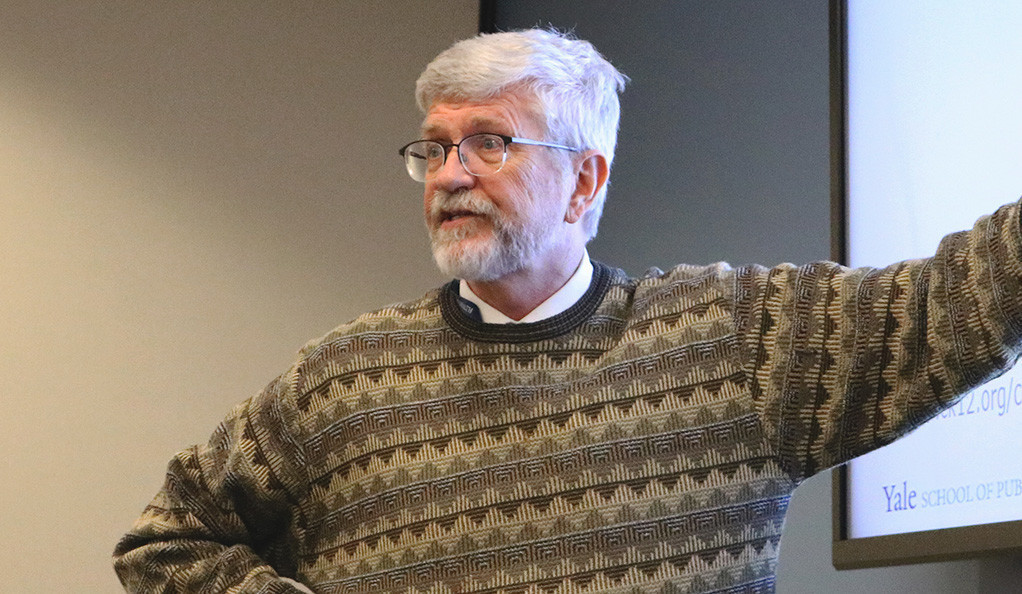SPH Dean’s next venture to drive down treatment costs
With his extensive background in public health and epidemiology, School of Public Health Dean Sten Vermund has recently joined the Innovation and Public Health Advisory Council at biotechnology company Tevogen Bio, where he will join Ryan Saadi SPH ’95.

Yale Daily News
Pharmaceutical company Tevogen Bio announced earlier this month the appointment of Yale School of Public Health Dean Sten Vermund as the inaugural chairman of the company’s Innovation and Public Health Advisory Council.
Vermund will join the newly-formed IPHAC at Tevogen Bio as its first chair. The IPHAC’s role is to advise the company on public health priorities based on the analysis of regional and national data and on best practices to improve health outcomes. According to Tevogen Bio’s website, the company’s mission is to leverage its cell and gene therapy platforms to innovate breakthrough and accessible immunotherapeutics for life threatening cancers and viral infections for which limited treatment options are available. Vermund said that Tevogen Bio wants his help with the company’s effort to focus on affordability and access to therapeutics, especially because of Vermund’s extensive background in public health.
“The CEO asked if I could help him with his dream, which is he would like to create a public health pharma company,” Vermund told the News. “And what he means by that is he would like to drive costs down so that products can be more available for low-income Americans and low- and middle-income nations.”
Vermund said that he heard about Tevogen Bio from CEO Ryan Saadi SPH ’95, who reached out to him a few years ago to share his vision on the company.
According to Saadi, Vermund was a standout in the field of candidates.
“We evaluated many candidates, but it became clear that Dr. Vermund’s rare expertise and dynamic leadership ability would be well-suited for the work of the IPHAC as we continue to be confronted with new SARS-CoV-2 variants and other life-threatening infectious diseases,” Saadi wrote to the News.
Vermund said that Tevogen Bio mostly focuses on T cell therapies. The company’s website specifically highlights its focus on CD8+ T Lymphocyte therapeutics for common cancers, as well as serious viral infections such as Hepatitis B.
Lindee Goh, a fellow IPHAC member and partner at Tapestry Networks, wrote to the the News that Tevogen Bio focuses on COVID-19, oncological diseases and multiple sclerosis — all of which raise questions about health equity and accessibility which Vermund is well positioned to help address.
“Dr. Vermund’s deep expertise on these questions, bringing efficacious clinical and public health tools to the field for assessing efficacy and scaling up in operations for HIV care and cervical cancer screening, and most recently in COVID-19 interventions, will be essential as the council advises on public-directed programs and approaches,” Goh wrote to the News.
Vermund said Saadi wants him to “continuously remind” the board and company leadership of the need for low-cost manufacturing, and the opportunity for the company to make money by volume sales. Currently, Vermund said T cell-based innovative products are “not cheap,” but that the model of selling at a low cost and making money by volume would be similar to how generic drug manufacturers in India make money.
While Vermund said Saadi may call up individual members of the IPHAC for advice based on their individual expertise, in general, the group will work together.
“The council is a collective wisdom, and it’s universal in companies that they have advisors,” Vermund told the News.“I think that not everyone on the council will agree on a particular issue, so it’s important that if I have a point of view, I express it so others can, can agree, disagree, modify my advisory.”
Saadi noted that each member of the IPHAC plays an important role in Tevogen Bio’s mission, and the IPHAC is currently engaged in “ongoing discussions with leadership.”
“Each member of the Council brings expertise, passion, vision and dedication to improving health outcomes of all people which is in concert with our mission to bring lifesaving immunotherapies to large patient populations,” Saadi wrote to the News.
Vermund has served as dean of the School of Public Health since 2017. In October, the University announced his resignation from the post, although school affiliates said the three-year contract Vermund was offered was nonstandard and an attempt to push Vermund from the role.
Vermund has a strong background studying epidemiology for over 40 years, and he said this background will help him advise on Tevogen Bio’s technologies since they apply to cancer and a variety of other infectious agents. He has served as the principal investigator of the Adolescent Medicine HIV/AIDS Research Network and the NIH Prevention Trials Network, as well as an elected member of the National Academy of Medicine and a Fellow of the Royal Society for Tropical Medicine and Hygiene.
In his early research, Vermund focused on the interaction of HIV and HPV to increase women’s risk of cervical cancer, so he hopes he can be helpful in dealing with both infectious diseases and cancer, he said.
Tevogen Bio has also recently developed TVGN-489, a T Cell therapy for COVID-19. TVGN-489 has shown to be effective at targeting SARS-CoV-2 in preclinical studies, and it is currently in clinical trials for high-risk patients.
Vermund told the News he is currently researching more about TVGN-489 and Tevogen Bio’s other recent developments to prepare for his first meeting with the IPHAC. He has worked in COVID-19 research and prevention since the onset of the pandemic and has advised on mask wearing with schools and organizations, so he feels he is “sure to have a point of view” on TVGN-489 based on his knowledge of what is needed in the marketplace of COVID-19 treatments.
Tevogen Bio was founded in 2020.







